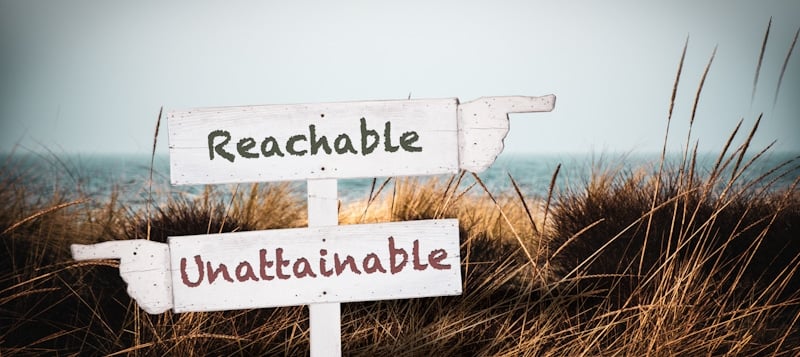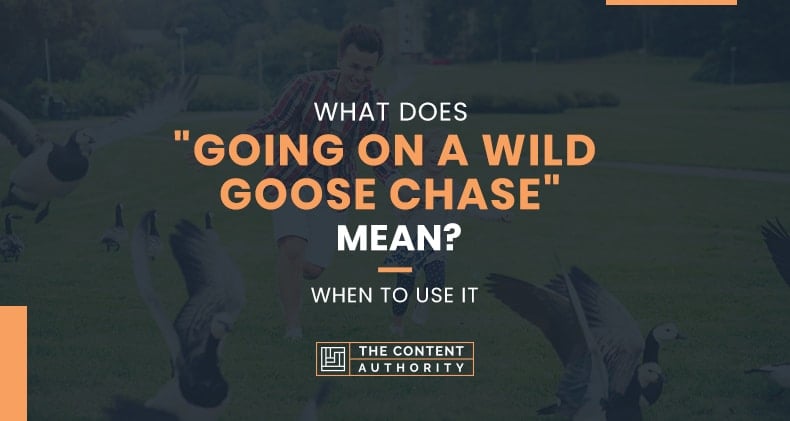There are many idiomatic expressions you will come across in speeches, books, movies, and other educational programs. One of the common ones is “going on a wild goose chase.” People still make errors when using this phrase because they do not fully understand it.
“Going On A Wild Goose Chase” is an idiomatic expression that means a useless or futile search or pursuit for something you cannot achieve or attain. An example of the idiomatic expression is John was going on a wild goose chase to become president of the country.
This little explanation should provide insight into the meaning and use of this expression and what this article will be all about. There is a hundred percent guarantee that you will have a good understanding of the expression “going on a wild goose chase” and how to use it correctly.

What Does “Going On A Wild Goose Chase” Mean?
It is essential to note the distinct difference between idiomatic expressions and proverbs or proverbial phrases. Idiomatic expressions are expressions with a deeper meaning, while proverbs are words of wisdom, guidance, and advice.
The expression “going on a wild goose chase” is an idiomatic expression. To correctly use this expression, you have to know what it means. Hence, we will dive into the meaning of this expression.
The idiomatic expression “going on a wild goose chase” refers to a lengthy and complicated search which is usually fruitless. It also means wasting your time to search for something or someone you cannot find because the person or thing does not exist.
It also means trying to achieve something beyond your reach or cannot be achieved. It also refers to a situation where a person is spending his whole time and doing everything possible to get something impossible.
When a person is wasting resources to work on something that does not exist or achieve something unachievable, you can say that person is “going on a wild goose chase.” It also refers to making an effort to get or achieve something pointless.
When you use the expression “going on a wild goose chase,” it can also mean sending someone to go get something that cannot be gotten or is impossible to find to get rid of them or as a punishment.

The Origin Of The Phrase “Going On A Wild Goose Chase”
The phrase “going on a wild goose chase” is an ancient phrase introduced to the English Language by Shakespeare. The first time this phrase was used was in Romeo and Juliet, a book written by Shakespeare in 1592.
In Act 2, scene 4 of the book, Romeo was winning Mercutio in a battle of wits, Mercutio requested an intervention from Benvolio. However, Romeo says if Mercutio surrenders, he is the winner of the battle.
Our knowledge of the phrase today differs from that in the use of Shakespeare’s book, as the meaning of the phrase in the book titled Romeo and Juliet refers to horse racing, not hunting as many think.
A “wild goose chase” in Shakespeare’s book refers to a race in which all the other horses will pursue the lead horse at a set distance. This is similar to the pattern in which a skein of geese flies; all the geese follow the lead goose.
The old form of the horse race was called “Wild Goose Chase,” there was no definite or predictable course the race followed; this is how the modern meaning of the expression came to be used.
A group of horse riders start a race together, and the riders are forced to follow the course the rider who gained the lead chooses. They are also compelled to do everything he does.
The meaning of the phrase as referred to by Shakespeare has been lost since the 19th century. The new meaning of the phrase that we all know was introduced in Grose’s Classical Dictionary of the Vulgar Tongue, 1811.
In the Spanish Gipsie, a play that featured Thomas Middleton and William Rowley, which was performed in 1623, the phrase “wild goose chase” was used in a dialogue between Diego and Lewys.
Although the origin of the idiomatic expression has been credited to Williams Shakespeare, some claim he was using an already established expression. The phrase had always been used to describe hunting with horses.
Many movies are titled the same as the phrase like “The Wild Goose Chase,” a comedy stage play that John Fletcher wrote in 1621. An American comedy-drama film titled “The Wild Goose Chase,” which was directed by Cecil B. DeMille in 1915, and a crime novel written by W.J. Burley was titled Wycliffe’s Wild Goose Chase.
It would be best if you kept in mind that the expression “going on a wild goose chase” has no connection with wild goose or chasing them.
How People Use The Phrase “Going On A Wild Goose Chase”
Having understood the meaning and the origin of the expression “going on a wild goose chase,” knowing the correct way to use it is also necessary to use it accurately in writings and speeches.
The phrase “going on a wild goose chase” is used when a person is searching for a thing or a person that does not exist or is in an entirely different place from where they are searching.
Another way of using the expression is to achieve a goal or vision that seems impossible and almost unattainable. You are trying to achieve something no one has ever done before or something beyond your reach.
You can also use the expression “going on a wild goose chase” to describe a situation where one wastes lots of resources on something unattainable or does not exist. It is also used when you are making a fruitless and useless search or pursuit of something.
People who are “going on a wild goose chase” are usually said to be wasteful and idle, have nothing to do, and waste resources for nothing important. You can also use the expression if you sent someone as a form of punishment to search for something that does not exist.
The expression “going on a wild goose chase” can also be used to describe the pursuit of something complicated to achieve to the point that it feels like time, energy, and resources are wasted.
When a person is conducting a futile search for something that does not exist or cannot be found, you use the expression “going on a wild goose chase” to describe that situation.

Illustrative Examples Of How To Use The Idiomatic Expression
Our next focus is on some illustrative examples that show how you use the idiom “going on a wild goose chase” correctly and clarify the meaning.
- The arrested suspect escaped from police custody on the way to the court, and the police are probably going on a wild goose chase to find him after he disappeared into the woods.
- The scientist was very lucky to notice they had tampered with his research, and they would have achieved their aim of sending him on a wild goose chase if he continued with the research.
- David had been on a wild goose chase all morning, and he was searching for his research note. Unknown to him his younger brother had taken it to his school.
- The best advice I received from my professor is to be sure the information or proof I have is authentic, or I would be going on a wild goose chase unknowingly.
- I spent the entire day searching all the grocery stores around the block for a cookie I loved; apparently, I had gone on a wild goose chase as it was not in production anymore.
- Dave, who was barely known in his class, decided he would contest as president of the department. I told him it was a wild goose chase if he persisted; eventually, he lost by a wide margin.
- I searched everywhere in the garage for a 3-inch nail, but I could not find it anywhere. It felt like I embarked on a wild goose chase.
- Jones mum told us, if we see a fashion item we liked, we should buy it when it is in season and everywhere, or we would be going on a wild goose chase searching for it.
- Jude wanted to prove that humans lived in a multiverse and there are other dimensions of the earth; in the end, he realized he had been on a wild goose chase as he could not prove it.
- As punishment for disturbing the class, the lecturer gave John an impossible task; we discovered later it was a wild goose chase.
Final Thoughts
As straightforward as an idiom may seem, without a comprehensive understanding of it, you would only misuse it and make your writings challenging to read and understand. Communication is only effective when the right message is passed across without interference or misunderstanding.
“Going on a wild goose chase” is an idiomatic expression that explains many things that are happening around. If you pay a little attention, you will discover that everything in life is connected.
Shawn Manaher is the founder and CEO of The Content Authority. He’s one part content manager, one part writing ninja organizer, and two parts leader of top content creators. You don’t even want to know what he calls pancakes.

